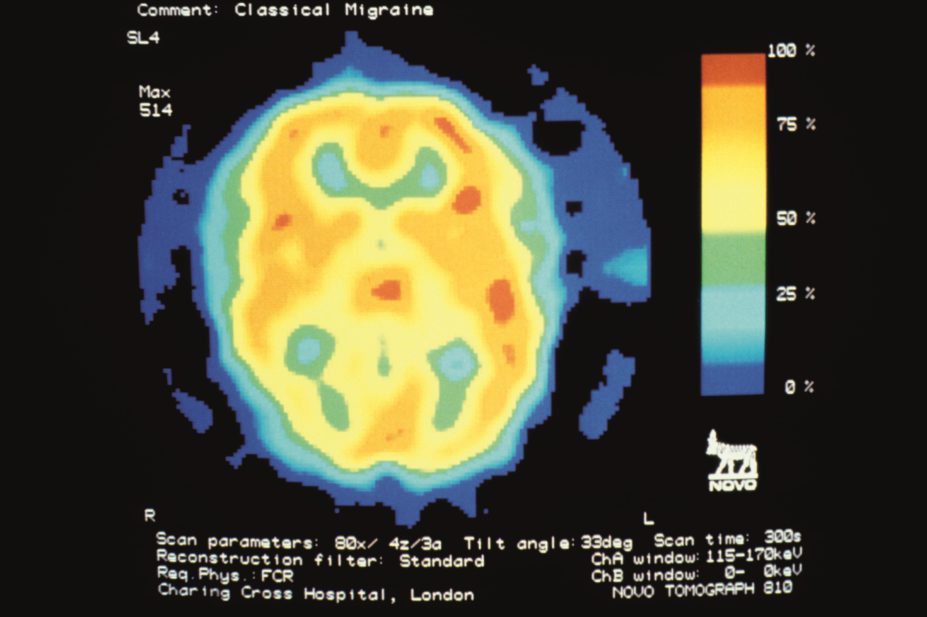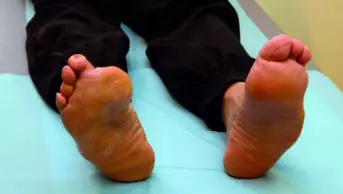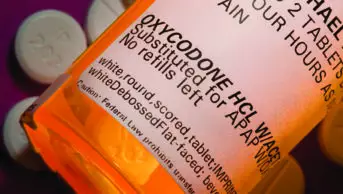
The Princess Margaret Migraine Clinic Charing Cross Hospital, London / Science Photo Library
Triptans and dihydroergotamine (DHE) can be used to treat basilar and hemiplegic migraine without an increased risk of stroke, according to research published in the May 2016 issue of Headache
[1]
.
The two drugs are generally avoided when treating these types of migraine because of a perception that they heighten the risk of adverse ischaemic vascular events, but the research adds to growing evidence that this is not the case.
“Our study suggests that triptans may be a safe option for patients who have hemiplegic and basilar migraine, and who otherwise have inadequate abortive treatment options for their migraines,” says lead researcher Paul Mathew, a neurologist at Brigham and Women’s Hospital in Boston.
The researchers conducted a retrospective analysis involving 80 patients with symptoms pointing to a basilar or hemiplegic migraine diagnosis who had received either triptan or DHE treatment off label. No cases of stroke or heart attack occurred during the routine follow-up period of several months.
A total of 67 patients had symptoms of basilar migraine and 13 had symptoms of hemiplegic migraine. Triptans were given to 40 and 5 of these patients, respectively, with the remainder receiving DHE.
In the triptan group, five patients reported adverse effects, including gastrointestinal upset, rash, neck dystonia, nightmares and flushing. Five patients in the DHE group had adverse events including chest tightness, dystonic reaction, transient asymptomatic anterior T wave inversion and agitation.
Although other studies have focused on this effect before, the researchers say their study has the largest patient cohort to date, and is also one of the first to examine patients treated with DHE. “The absence of signiï¬cant adverse events with triptan use in migraine patients with basilar features adds to the data that suggest that signiï¬cant basilar artery vasoconstriction may not be part of the pathophysiology of basilar migraine,” they say.
In contrast to other types of migraine, the pain of basilar and hemiplegic migraine had previously been thought to be caused by a constriction rather than swelling of the blood vessels of the brain. Because triptans and DHE were thought to relieve migraine, in part, by constricting blood vessels, drug developers excluded patients with basilar and hemiplegic migraines from initial studies because of concerns that they could put these patients at greater risk of stroke.
Senior researcher Brad Klein, medical director at the Headache Center at Abington Hospital-Jefferson Health, says: “As a result, no one ever actually showed that these drugs were dangerous, they were just assumed to be dangerous based on their mechanism of action.”
Peter Goadsby, a trustee of the Migraine Trust and professor of neurology and director of the National Institute for Health Research/Wellcome Trust Clinical Research Facility at King’s College Hospital in London, says it has been recognised for more than 15 years that DHE or triptan are unlikely to have an effect on basilar and hemiplegic migraines.
An enormous sample size would be required to demonstrate the drugs’ safety, Goadsby explains. “The problem is the medicines were developed on the false premise that there was blood vessel involvement in migraine and that turned out not to be true,” he adds. “New medicines are being developed on a nerve basis and the question will go away in about 1.5 – 2 years as new nerve based medicines are tested and marketed. It’s another piece of evidence that nerve based therapies are on the right track. It illustrates that we need new therapies that have got clean records and they are in development.”
References
[1] Mathew PG, Krel R, Buddhdev B et al. A retrospective analysis of triptan and DHE use for basilar and hemiplegic migraine. Headache 2016. doi: 10.1111/head.12804


